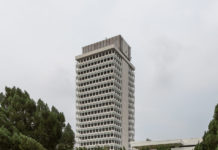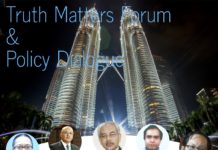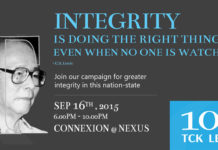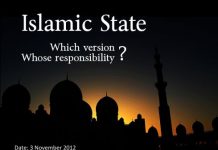
Parliamentary or Constitutional Supremacy?
Two weeks ago the High Court Judge decided to allow former MP Tawfik Tun Dr Ismail to have his case litigated at the High Court. His case was against the Speaker of the Dewan Rakyat in allow the tabling of the PUU 355 by PAS President without referring the matter to the Council of Rulers, as required by the Constitution.
Premised upon this consideration, some NGOs with Ohmsi Sdn Bhd and Knowledge Summit Sdn Bhd are planning to host a Forum Perdana on the above topic on 10th March 2018. My case for the dialogue is as follows:
Is Parliament supreme?
I went to High Courts complex in Jalan Duta on 19th February 2018 to give moral support to my RMC colleague, Tawfik Tun Dr Ismail, whom I call TTDI, the same acronym for the project remembering his Dad as launched by the Urban Development Authority of the older days!
The case has been filed against the Speaker of the Dewan Rakyat, premised upon the same letter of notice which the same Speaker refused to accept in Parliament more than a year ago! I did turn up in Parliament on that day, although TTDI was not permitted to come in. Some good MP friends even gave me a free lunch in our august House.
Yesterday, the Judge however did not give his TTDI judgment, even though the case before us was the case of the Opposition MPs who took the same Speaker to court over the “refusal to allow the debate of the 1MDB in Parliament.” The Judge basically ruled that that was an almost absolute right of the Speaker!
Supremacy of the Federal Constitution
Article 4 of our Federal Constitution (FC) clearly and unequivocally states the supremacy of the FC. Therefore the question I have for the Judge who hears the TTDI case is? Can PUU 355 be tabled without reference to the Council of Rulers; as was done with the NSC Bill, and now Act?
While I may agree that MPs case against the Parliament’s Speaker, and maybe a case of poor chairmanship of any meeting, premised upon their ground rules as agreed and dictated on the Floor of that House; the TTDI case is fundamentally different!
The TTDI case actually asks the “rhetorical question which is the title of my piece.” Is Parliament really the supreme law of our nation-hood? While on matters of urgency, even though I would not agree that 1MDB was not an urgent case for Parliamentary Review, the Speaker can elect to exercise his rights of “chairpersonship,” as agreed and documented by the rules of the House.
The TTDI case questions the primacy of the Federal Constitution over that of the Parliament, which is merely one arm of governance. I have elsewhere argued that we have 7 institutions of good governance; i.e. the Parliament or the Executive, is only one of them. In Malaysia, the Conference of Rulers, especially in any matter related to religion if Islam, must refer these matters to them before the bill is tabled for law-making.
Alamak! All in God’s Name
The above was my retort to the illogical conclusion of DUMNO and PASt, on behalf of all Malays, that Allah was just an Arabic word, but even more so, it is now deemed to become a Malay word “owned and monitored by the Government of the Day,” as if they are the only full “owners or custodians” of the Dewan Bahasa dan Pustaka!
Stupidity is not the privilege of politicians, but equally of ignorant religious-types who genuinely have no gnosis about the same! Therefore, when the Government of the Day agreed that Bumiputeras of Sabah and Sarawak can in fact use the same “Allah word,” in East Malaysia but not in Peninsular Malaysia; it is the height of stupidity!
Malaysia needs to move beyond such toxic politics of weak and misguided religious thought (but not faith though); one which cannot be dialogued, debated, or discussed in public spaces! How then can we decide what is the morality of common public spaces in Malaysia?
Three Case Studies
Currently there are three publicly visible cases which deal with three nuanced questions, as part and parcel of Federal Court’s civil jurisdiction. The first is the Gandhi Case which delivered its judgment recently. The next is the Rafizi Case, which is only in its initial stages, but has attracted much publicity and concern of all Malaysians about doubles standards in prosecution. Finally there is the third case, wherein the Judge agreed with the arhuments of the plaintiff, Tawfik Tun Dr Ismail.
Regardless of the particular decision in the unresolved two cases still before the courts, it is my contention that, in either case, the Gandhi case will carry serious and full-fledged implication on all future cases, especially those dealing with the role of specific religious authorities in Malaysia.
Furthermore, as OHMSI and partners are also pondering how to announce a programme to raise funds for YB Rafizi Ramli and his accomplice plus families, in case they are actually committed to 30 months jail as charged, after full due processes.
This proposal invited Prof Shad Saleem Faruqi, Dr Gurdial Singh Nijar, Researcher Thulsi Manogaran, and Lawyer Rosli Dahlan to address the topic of discussion. Each speaker will only be given 10 minutes. We will have a non-lawyer as a moderator.
I hope to meet each of you on 10th March 2018 at 3.30pm at PAUM coffee house and thereafter to the Forum Perdana at 4.00-6.00pm. High Tea is served for all present. Please call me if you have any questions. Thanks.
KJ John (HP: 60123451950),
RMC Old Puteras for Accountability,
C/O Ohmsi Sdn Bhd and Knowledge Summit Sdn Bhd.















